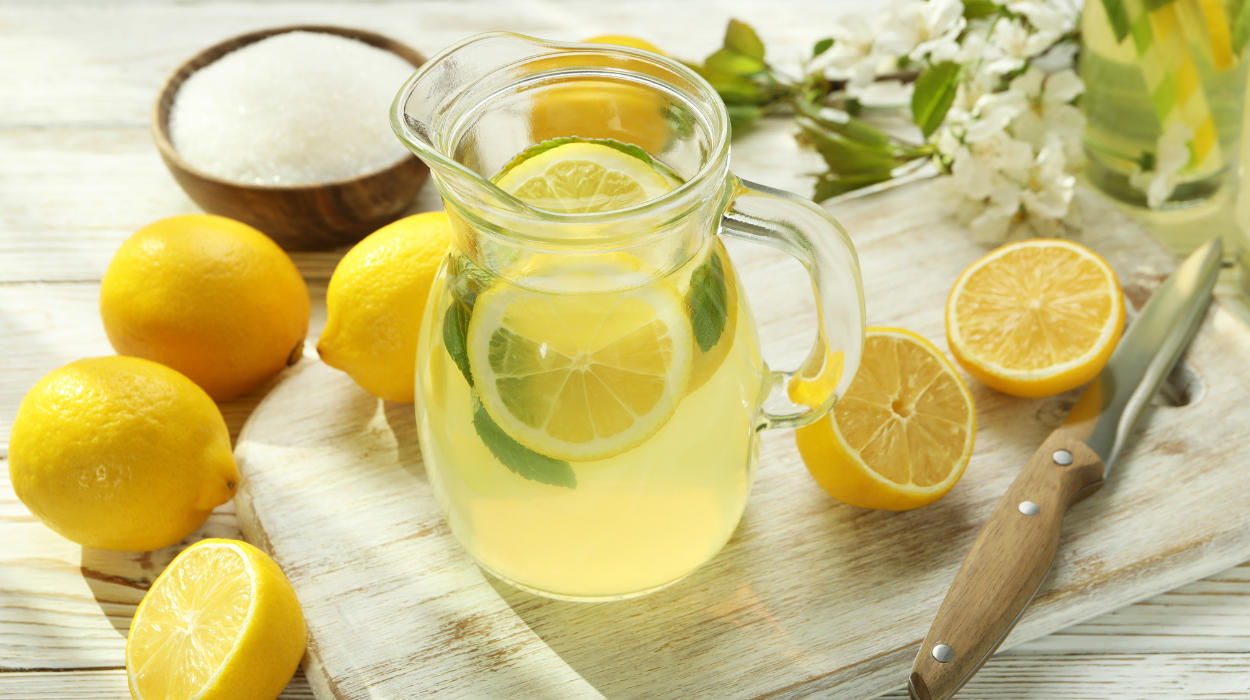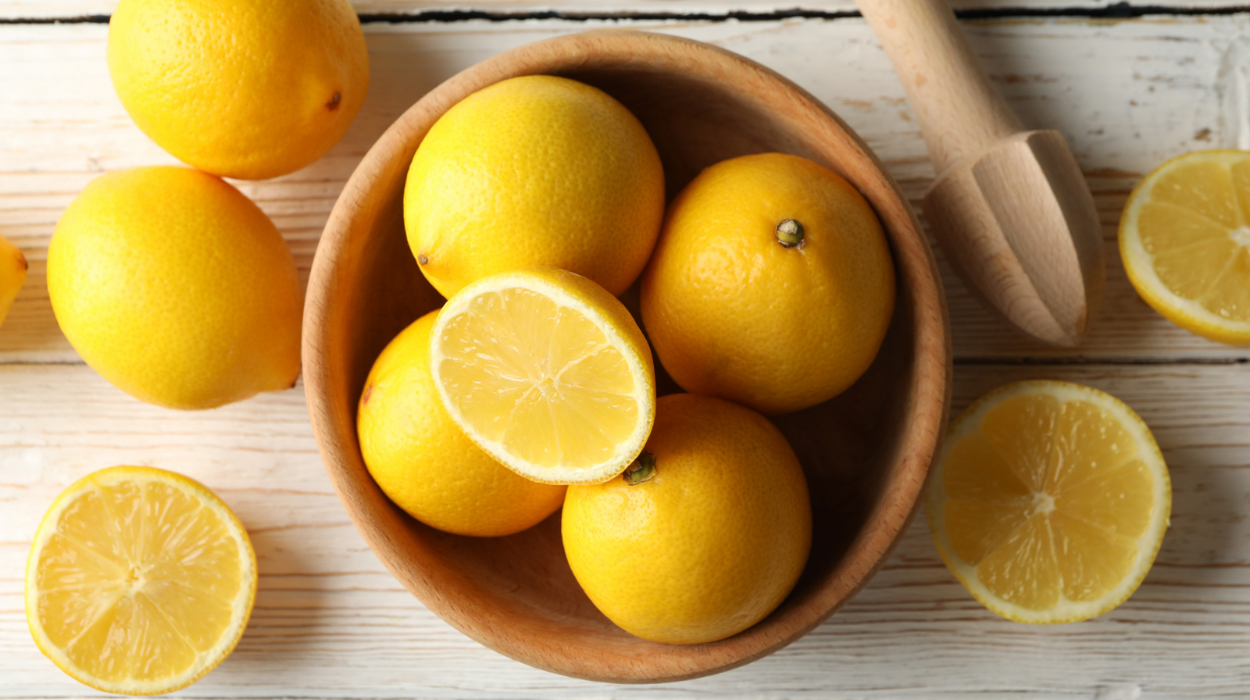Lemon is a sharp citrus fruit with several health benefits. High in vitamin C and health-promoting polyphenols, lemon is more than a garnish — it could also enhance your long-term well-being. Regularly consuming lemon juice or lemon water could improve your energy levels, boost cardiovascular health, reduce blood pressure, and more.
Read on to learn how lemon benefits your health and how to include more lemon in your daily diet.
How Can Lemons Benefit Your Health?
- Prevents anemia.
- Lowers blood pressure.
- Improves cardiovascular health.
- Boosts energy levels.
- Prevents kidney stones.
Five Incredible Health Benefits Of Lemon

The health benefits of lemon extend throughout your body. Consuming lemon could elevate your energy levels, alleviate anemia, protect your kidneys, and support healthy heart function. Adding lemon to your water could also encourage you to stay hydrated and may even contribute to weight loss.
Prevents Anemia
Anemia is a blood disorder in which a person’s red blood cell levels are lower than normal.[1] This reduces the oxygen-carrying capacity of the blood and often leads to fatigue, shortness of breath, and heart palpitations. Iron deficiency is one of the main causes of anemia, and lemons may help address this.
Lemons don’t contain much iron. However, they are high in vitamin C, which is known to improve iron absorption.[2] Consuming lemons may help[3] your body absorb iron from your food.
Therefore, eating lemons and drinking lemon juice could boost your iron levels and increase your number of red blood cells. Having healthy iron levels can address iron deficiency and may help prevent or improve the symptoms of anemia.
Lowers Blood Pressure
High blood pressure, or hypertension, is a significant health concern that affects around one-third of adults[4] worldwide. High blood pressure is considered the leading cause[5] of cardiovascular disease, chronic kidney disease, cognitive impairment, and premature death globally.
Regularly consuming lemon and other citrus fruits may improve blood pressure.[6] This is because lemon juice contains citric acid, which is thought to have anti-hypertensive properties. Eating lemons daily could help keep your blood pressure stable, reduce your risk of serious illness, and improve heart health.
Improves Cardiovascular Health
The citric acid in lemon juice can promote healthy blood pressure, reducing the risk of cardiovascular disease. However, this isn’t the only way lemons can benefit heart health.
Like other citrus fruits, lemons are rich in plant compounds called flavonoids. Citrus flavonoids have many health-promoting properties, including cardioprotective effects[7] that could reduce your risk of heart disease.
For example, hesperidin is a flavonoid found in oranges and lemons with antioxidant and anti-inflammatory effects. It can protect your heart from oxidative stress, which is damage caused by reactive, oxygen-containing molecules called reactive oxygen species. There is a strong link[8] between oxidative stress and cardiovascular disease, but eating lemons could help mitigate this damage.
Lemon polyphenols can also help prevent atherosclerosis,[9] an inflammatory disorder in which arteries are narrowed by the build-up of fatty plaques. Atherosclerosis is a major risk factor for serious heart conditions such as coronary artery disease, stroke, and heart disease. Therefore, daily consumption of lemon could help keep your heart and blood vessels healthy.
Boosts Energy Levels
Consuming lemon juice could brighten your day by boosting your energy levels. Lemons are a rich source of citric acid, vitamin C, and polyphenols, all of which play a role in alleviating fatigue.[10]
One study found that taking citric acid before exercise reduced physical fatigue.[11] Vitamin C was also found to improve energy levels[12] among people experiencing fatigue as a symptom of long-term COVID-19. Polyphenols help relieve extreme tiredness[13] by counteracting the damaging effects of oxidative stress and inflammation.
If you could use a natural energy lift, try adding lemon juice to your water in the morning or before you work out.
Prevents Kidney Stones
Fresh lemon juice could help keep your kidneys healthy by preventing kidney stones.
Kidney stones form[14] due to a build-up of crystal-forming substances, like calcium, in urine. They are often extremely painful and, if left untreated, could lead to a kidney infection. Having kidney stones also increases your risk[15] of chronic kidney disease.
Citrate, a component of citric acid, binds with calcium[16] and prevents the formation of kidney stones. Therefore, ingesting lemon juice — a natural source of citric acid — could help protect you from kidney stones.
Research suggests that taking two tablespoons of lemon juice twice a day reduces the risk of kidney stones.[17] If you’d like to try this, try adding lemon juice to your water in the morning and afternoon.
Does Lemon Help With Weight Loss?
Many people claim that lemon is one of the best fruits for weight loss, but the science behind these potential beneficial effects is shaky. Some small studies suggest that lemon juice could help you lose weight, but participants in these studies are often on a low-calorie diet.[18] Therefore, it’s unclear whether the weight loss is due to the effects of lemon or calorie restriction.
However, drinking lemon juice detox water could encourage you to hydrate, and drinking more water could contribute to weight loss. Increased water intake is associated with increased weight loss,[19] possibly because drinking more water can reduce your appetite.
Drinking water before and during meals can increase feelings of fullness.[20] This can help limit your calorie intake and aid weight loss.
If you’re trying to lose weight or simply want to increase your water intake, add lemon juice to your water bottle. Improving the flavor of your water may encourage you to drink more, which can help curb your appetite at mealtimes.
Lemon Nutrition Facts
One lemon contains 16.8 calories,[21] 0.6 grams of protein, 5.4 grams of carbohydrates, and 1.6 grams of fiber. It also contains essential micronutrients, including calcium, iron, magnesium, phosphorous, potassium, vitamin C, and folate. Lemon juice[22] has almost the same nutritional value as whole lemon but does not contain fiber.
Types Of Lemons
Lemon, or Citrus limon, is a citrus fruit with many different varieties. Lemons grow best in hot countries and are produced worldwide in sub-tropical and inter-tropical climates.
Different regions grow different cultivars,[23] but the most common lemon varieties include Lisbon lemons, Eureka lemons, and Bearrs lemons.
Healthy Ways To Use Lemons And Limes

Lemon is a versatile fruit that can be enjoyed in numerous ways. Due to their sour taste, lemon and lime are not typically eaten fresh like other citrus fruits. Instead, they are usually used to enhance the flavor of other dishes.
Lemon juice and lemon zest can add acidity to savory dishes or be a key flavor in baked goods. They can also add a burst of freshness to fruit salads and smoothies.
Many people like to add lemon peel or juice to water. Cold lemon water makes a refreshing drink, but you can also heat it up and add honey to make lemon tea.
Hot lemon water is particularly beneficial when you have a cold and can soothe a sore throat. For an extra health boost, add some ginger root. The antioxidant benefits of drinking lemon and ginger tea may improve liver function.[24]
Eating a variety of healthy vegetables, fruits, and whole grains has multiple benefits for your digestive system and general health. Fruit and vegetable supplements like green powder are an easy and convenient way to get more essential micronutrients in your diet.
Potential Risks Of Lemons And Lemon Juice
Lemons have a lot of health benefits, but too much can damage your teeth.[25] This is because lemon juice contains citric acid, which can erode tooth enamel. Tooth enamel erosion can lead to other dental issues[25] such as sensitivity, pain, tooth decay, and discoloration.
If you’re drinking lemon water, you may be able to avoid enamel erosion by drinking through a straw. This will minimize the contact of lemon juice with your teeth and help prevent damage.
Most people can drink lemon juice every day without side effects. However, due to the acidity of lemon, people with sensitive stomachs may experience digestive issues. If you have stomach pain, bloating, diarrhea, or nausea after drinking lemon juice, you may have to avoid it.
Conclusion
Lemon has a variety of health benefits due to its high vitamin C, citric acid, and polyphenol content. Together, these nutrients can lower blood pressure, improve cardiovascular health, improve iron absorption, enhance energy levels, and prevent kidney stones. Adding lemon juice to your water can also encourage you to hydrate more, which may aid weight loss.
Frequently Asked Questions
Most people can drink lemon juice every day with no side effects. However, lemon juice is acidic and can damage your teeth. If you drink lemon water several times a day, use a straw to minimize contact with your teeth.
The word detox can be misleading. It’s not possible to detoxify your organs or any other body part, but there’s some evidence to suggest that lemon can improve liver function.[26]
Lemon juice is acidic, so drinking a lot of it can damage your teeth. You can protect your tooth enamel by drinking lemon water through a straw and by limiting your consumption of lemon water to a few cups a day.
No specific food can burn fat from your belly. Most people can lose body fat with exercise and a calorie-restricted diet. As you reduce your overall body fat percentage, the fat around your midriff should also melt away.
 Evidence Based
Evidence Based
